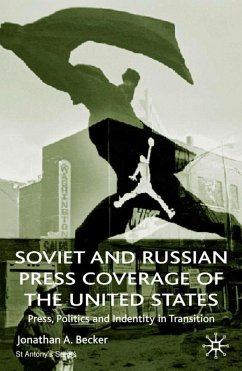This book examines changing Soviet and Russian press coverage of the United States from the emergence of Mikhail Gorbachev through the presidency of Vladimir Putin. A new afterword focuses on recent developments in the Russian media and Russian press coverage of the terrorist attacks of September 11, 2001. Becker argues that due to the absence of a language to support the reform strategy, the Soviet press presented positive images of its chief ideological and military opponent, the United States, as a means of supporting political, social and economic reform. He suggests that the end of the Cold War and the emergence of a more self-confident Russia means that the symbolic and discursive significance of the United States for Russia has diminished.
Hinweis: Dieser Artikel kann nur an eine deutsche Lieferadresse ausgeliefert werden.
Hinweis: Dieser Artikel kann nur an eine deutsche Lieferadresse ausgeliefert werden.
'Throughout this work, Becker demonstrates an exceptional understanding of Soviet reality and how it has modelled the post Cold War Russian press system. Becker's well organized, thorough analysis, combined with a strong narrative style, offers readers a sophisticated, yet easy-to-follow text appropriate for advanced undergraduates, graduate students and professors...a must-read text for anyone wishing to make sense of the contemporary Russian press.' - Robyn S. Goodman, Journalism & Mass Communication Quarterly
'The book is clearly written, contains a wealth of materials and in view of the misunderstandings that continue to bedevil American-Russian relations, is timely.' - Frank Ellis, Slavonic and East European Review
'A rare combination of 'external' observation of Russian politics with 'internal' understanding of cultural code that allows him to provide readers with both objective and empathetic analysis of the recent ideological transformations in Russia...This stimulating book is an important contribution to the realistic assessment of where Russia is on its way to democracy.' - Nikolai Koposov, Dean, Smolny College, St Petersburg, Russia
'Becker manages to order a tremendous amount of material into a concise yet informative study...(that is) particularly valuable for scholars. Becker's monograph is also accessible to a wide audience: his care in translating quotations means the book can be fully appreciated by almost any reader, makingthe book a solid investigation into a recent and critical period in Soviet and Russian history.' - David J. Galloway, Slavonic and East European Journal
'The book is clearly written, contains a wealth of materials and in view of the misunderstandings that continue to bedevil American-Russian relations, is timely.' - Frank Ellis, Slavonic and East European Review
'A rare combination of 'external' observation of Russian politics with 'internal' understanding of cultural code that allows him to provide readers with both objective and empathetic analysis of the recent ideological transformations in Russia...This stimulating book is an important contribution to the realistic assessment of where Russia is on its way to democracy.' - Nikolai Koposov, Dean, Smolny College, St Petersburg, Russia
'Becker manages to order a tremendous amount of material into a concise yet informative study...(that is) particularly valuable for scholars. Becker's monograph is also accessible to a wide audience: his care in translating quotations means the book can be fully appreciated by almost any reader, makingthe book a solid investigation into a recent and critical period in Soviet and Russian history.' - David J. Galloway, Slavonic and East European Journal








